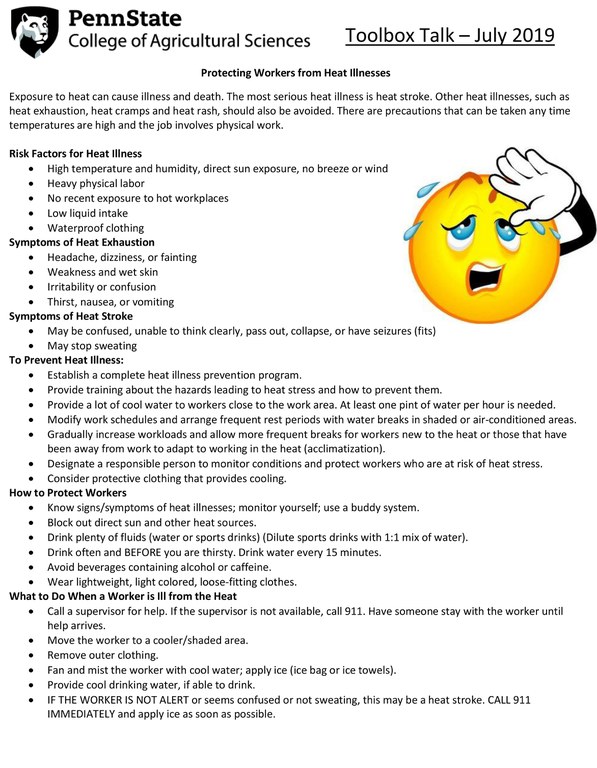Posted: July 18, 2019
Exposure to heat can cause illness and death. The most serious heat illness is heat stroke. Other heat illnesses, such as heat exhaustion, heat cramps and heat rash, should also be avoided. There are precautions that can be taken any time temperatures are high and the job involves physical work.
Risk Factors for Heat Illness
• High temperature and humidity, direct sun exposure, no breeze or wind
• Heavy physical labor
• No recent exposure to hot workplaces
• Low liquid intake
• Waterproof clothing
Symptoms of Heat Exhaustion
• Headache, dizziness, or fainting
• Weakness and wet skin
• Irritability or confusion
• Thirst, nausea, or vomiting
Symptoms of Heat Stroke
• May be confused, unable to think clearly, pass out, collapse, or have seizures (fits)
• May stop sweating
To Prevent Heat Illness:
• Establish a complete heat illness prevention program.
• Provide training about the hazards leading to heat stress and how to prevent them.
• Provide a lot of cool water to workers close to the work area. At least one pint of water per hour is needed.
• Modify work schedules and arrange frequent rest periods with water breaks in shaded or air-conditioned areas.
• Gradually increase workloads and allow more frequent breaks for workers new to the heat or those that have been away from work to adapt to working in the heat (acclimatization).
• Designate a responsible person to monitor conditions and protect workers who are at risk of heat stress.
• Consider protective clothing that provides cooling.
How to Protect Workers
• Know signs/symptoms of heat illnesses; monitor yourself; use a buddy system.
• Block out direct sun and other heat sources.
• Drink plenty of fluids (water or sports drinks) (Dilute sports drinks with 1:1 mix of water).
• Drink often and BEFORE you are thirsty. Drink water every 15 minutes.
• Avoid beverages containing alcohol or caffeine.
• Wear lightweight, light colored, loose-fitting clothes.
What to Do When a Worker is Ill from the Heat
• Call a supervisor for help. If the supervisor is not available, call 911. Have someone stay with the worker until help arrives.
• Move the worker to a cooler/shaded area.
• Remove outer clothing.
• Fan and mist the worker with cool water; apply ice (ice bag or ice towels).
• Provide cool drinking water, if able to drink.
• IF THE WORKER IS NOT ALERT or seems confused or not sweating, this may be a heat stroke. CALL 911 IMMEDIATELY and apply ice as soon as possible.
Additional Resources:
Pennsylvania Women's Agricultural Network
Address
302 Armsby BuildingUniversity Park, PA 16802
- Email pawagn@psu.edu
Pennsylvania Women's Agricultural Network
Address
302 Armsby BuildingUniversity Park, PA 16802
- Email pawagn@psu.edu


